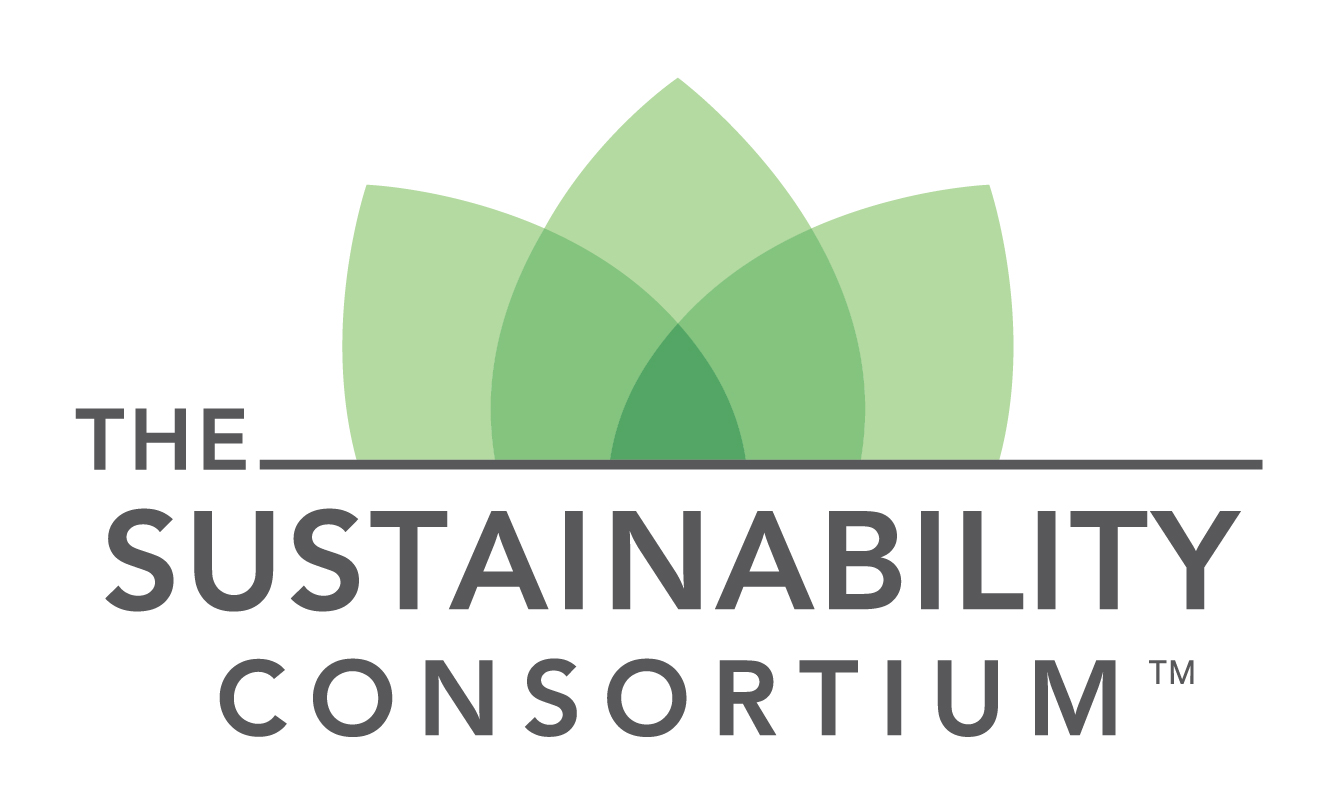


We want to thank McKinsey & Company, a global management consulting firm,
for providing the underlying analytical support for this report.
All products tell a story. The story used to be simple, but now people want much more information. The CEO of a large food and beverage company recently told me that, in the past, “a good product was one that tasted good and was safe.” But now, he says, it has to be “sourced, manufactured, and distributed responsibly.” Figuring out what that even means – and how to tell that story in an authentic way – is a big challenge. How can executive know, or prove, that they are successfully managing their products’ biggest environmental and social issues?
First, companies have to identify the largest impacts throughout the value chain. The work of the Sustainability Consortium has helped big brands and retailers understand that the biggest sustainability issues fall mostly outside their direct control – the real impacts are upstream with suppliers. Now, with this report, TSC helps answer a critical question: how much visibility do companies really have into their supply chains?
The answer is hardly academic and the stakes are high. Since the label “consumer goods” covers nearly everything we use in our daily lives, the sector has deep connections to all of the world’s greatest challenges, from climate change and water scarcity to food waste, child labor, and inequality. The scale of these challenges requires what I call a “big pivot”in how businesses (and society) operate. We need new strategies, including: focusing more on long-term value creation; setting bold science-based goals; asking “heretical” questions to drive new levels of innovation; making investment decisions differently to account for hard-to-measure intangible value; and collaborating radically in new ways with customers, governments, and even direct competitors.

SUSTAINABILITY STRATEGY ADVISER
AND AUTHOR
OF THE BIG PIVOT
If we have any hope of making a shift of this magnitude, the consumer goods sector will need to play a key role. It must innovate and help everyone consume smarter and better. More specifically, the pivot for retailers and manufacturers will mean getting far greater visibility into supplier operations. Then, armed with better information and more transparency, they can collaborate with suppliers to create aggressive programs to reduce impacts and rethink production and consumption across value chains.
It’s a significant and exciting challenge.
But solving the world’s biggest problems does make for quite a story. Together, we will write and tell a tale about new modes of sourcing, production, and consumption—a story of a more circular economy and a fundamental decoupling of human development from the impacts that threaten our collective well-being.
With its extensive set of partners and data, TSC offers a unique view on how progress toward sustainable consumption is actually going. All companies and executives should heed these lessons so they can tell a new story—one that people are demanding to hear.
With its extensive set of partners and data, TSC offers a unique view on how progress toward sustainable consumption is actually going
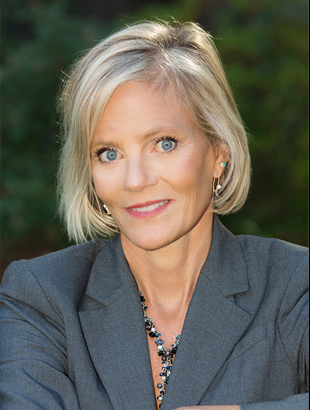
CHIEF EXECUTIVE OFFICER
THE SUSTAINABILITY CONSORTIUM
Dear readers, valued TSC members, partners, and the “sustainability curious,”
I am pleased to bring you The Sustainability Consortium’s first-ever impact report.
This report marks a major milestone for The Consortium. It celebrates the work we’ve accomplished to date in creating a system that will serve as an important barometer for the entire Consumer Goods Industry globally. It also marks a significant transition for us as we turn our focus towards the incredible potential for impact we can have through the implementation of our work. Finally, it is a call to action for the key players along consumer goods supply chains to move forward.
We could not have accomplished this without our hundreds of members, our partners, and the individuals dedicated to sustainable consumer goods.
While I have worked in sustainability for most of my professional career, it is here as the chief executive of The Sustainability Consortium that I truly see an incredible and very tangible path towards accomplishing a more sustainable world. Much of this is through our research, our metrics, and our activation and implementation efforts around more sustainable consumer goods supply chains. I am proud to present the work of an organization dedicated not just to sustainability science, but also to the collaboration and collective action that will drive the entire industry forward.
Our goal with this report is a call for collective action to transform the measurement and tracking of product sustainability and, more importantly, to drive transformational change that will make a real difference for our planet. I hope you will join us.
Sincerely,
Sheila Bonini

Consumer goods bring countless benefits to society, dramatically improving lifestyles around the world. These benefits however come with an increasingly sizeable sustainability price tag—both for people and the planet. Global production and use of consumer goods accounts for more than 60 percent of all greenhouse gas emissions, 80 percent of water usage, and two-thirds of tropical forest loss globally. With 2.5 billion more people joining the consuming class in the next few decades, we must address the production, use, and disposal of consumer goods: a sustainable world requires sustainable production and consumption.
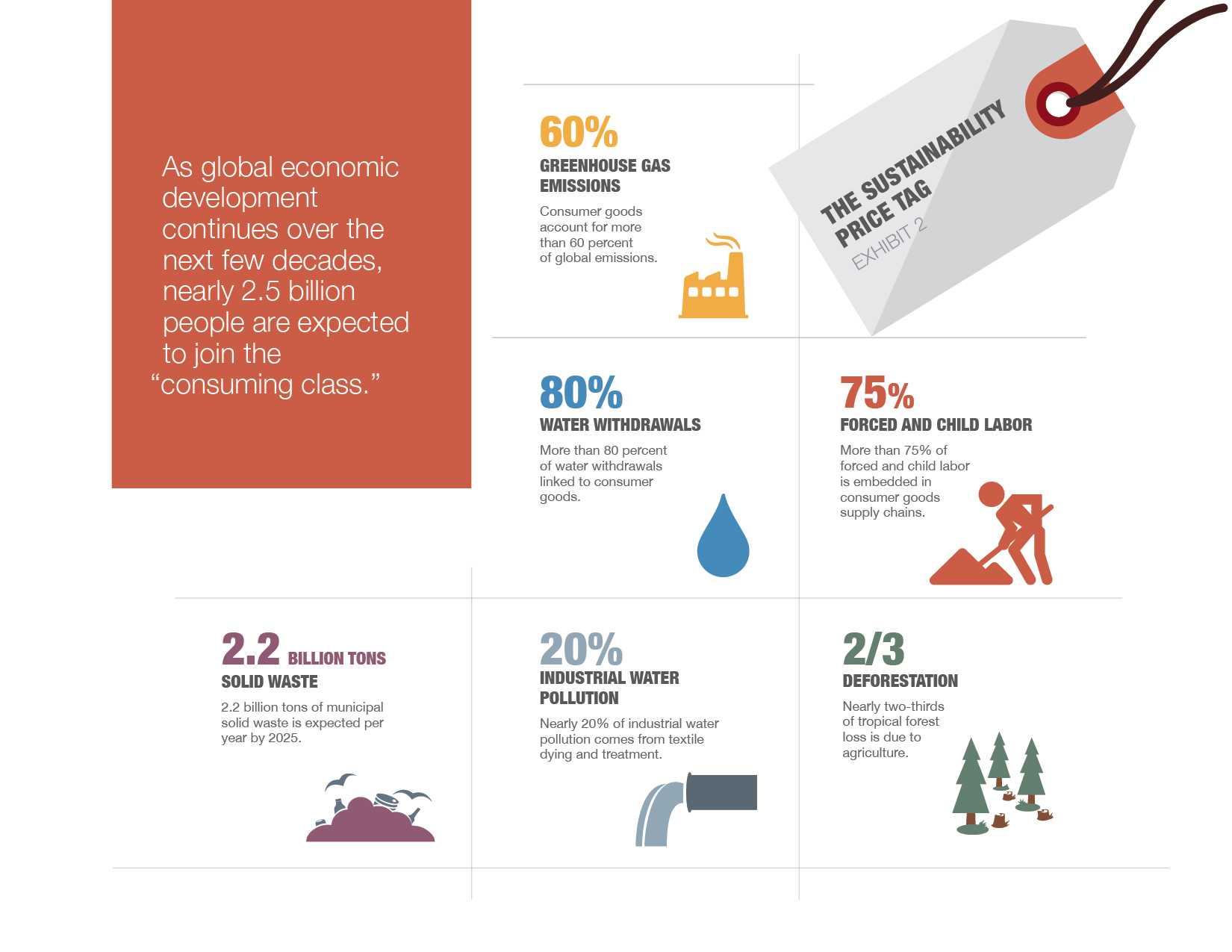
While progress has been made to make some consumer products more sustainable, the real imperative and opportunity for impact is to make all consumer products more sustainable. The Sustainability Consortium (TSC) was created in 2009 to transform the consumer goods industry by partnering with leading companies, NGOs, universities, and government organizations to define, develop, and deliver more sustainable products.
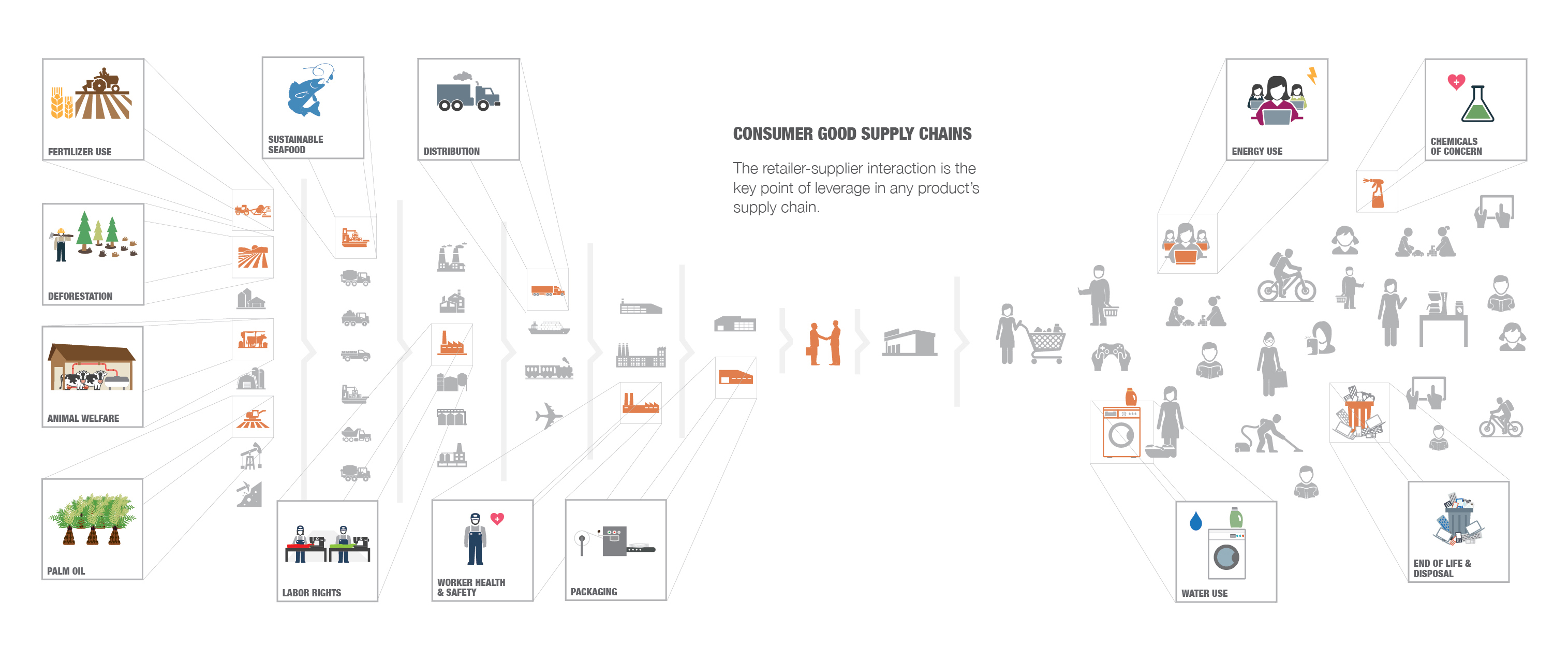
TSC uses a market-based approach to drive change. We believe that, if one retailer incentivizes more sustainable products, it can make a difference—but if multiple retailers send the same market signal, the world can change. TSC and its members have created a sustainability measurement and reporting system that now covers 80–90 percent of consumer goods. TSC uses science to identify the hotspots in different product categories’ life cycles, alongside stakeholder engagement and strategic partnership with other leading sustainability initiatives to develop key performance indicators in the form of a manufacturer survey. In 2015, Walmart, Sam’s Club, Kroger, and other retailers used these surveys to assess the state of sustainability of their products: this report summarizes those findings and provides recommendations towards action.
Click on the blinking supply chain phases to view hotspots and KPIs.
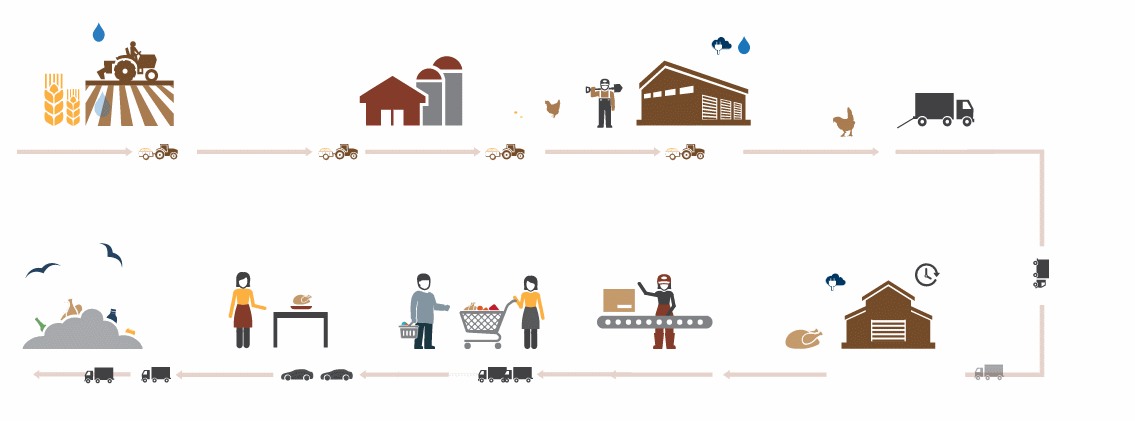
| HOTSPOTS | KPIs |
|---|---|
Environmental ImpactsFeed CultivationImproper management of soil, fertilizer, pecticides, water, and energy to grow feed causes pollution and affects workers, communities, climate, and natural resources. Clearing land for agriculture causes deforestation in some areas. |
|
| HOTSPOTS | KPIs |
|---|---|
Air qualityAnimal Farm OperationsChicken manure releases ammonia that causes air quality issues for workers and communities. |
|
Animal WelfareChickens may face health issues related to improper housing, nutrition, handling, transportation, and slaughter. |
|
Antibiotic UseAnimal Farm OperationsChickens may need antibiotics to treat disease but overuse can cause antibiotic resistence in humans and affect the environment. |
|
Energy ConsumptionAnimal Farm OperationsChicken housing operations use electricity and fuel which lead to climate change and pollution. |
|
Labor RightsAnimal Farm OperationsWorkers, especially women and migrants, may face labor issues including unfair pay. |
|
Manure ManagementAnimal Farm OperationsChicken manure releases greenhouse gases and can cause water pollution and climate change. |
|
Worker Health and SafetyAnimal Farm OperationsWorkers may be exposed to dust, chemicals, or other hazards on the farm. |
|
| HOTSPOTS | KPIs |
|---|---|
Animal WelfareChickens may face health issues related to proper housing,nutrition, handling, transportation, and slaughter. |
|
| HOTSPOTS | KPIs |
|---|---|
Animal WelfareChickens may face health issues related to proper housing, nutrition, handling, transportation, and slaughter. |
|
Energy ConsumptionProcessingProcessing and cooking chicken uses electricity which leads to climate change and pollution. |
|
TSC has found that there are no Hotspots identified in this stage that meet our scientific methodology.
*Currently supported browsers: Google Chrome, Mozilla Firefox, Safari, IE
![]() electricity use
electricity use
![]() water use
water use
Click on the blinking supply chain phases to view hotspots and KPIs.
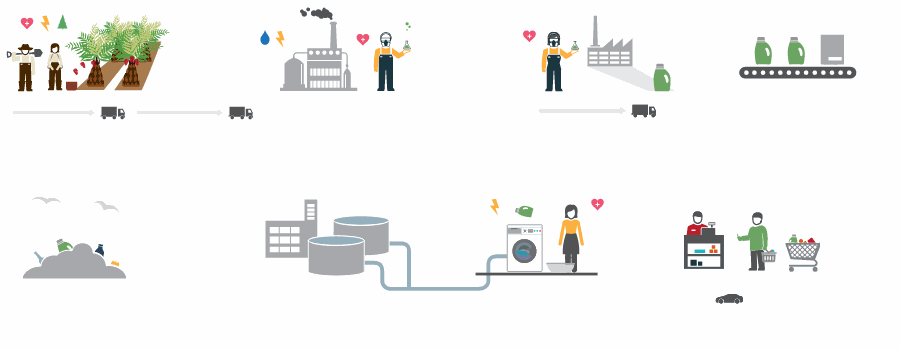
| HOTSPOTS | KPIs |
|---|---|
Enivornmental ImpactsPalm oil cultivation uses agricultural inputs and energy, and causes deforestation. |
|
Social ImpactsPalm oil cultivation causes issues such as worker and community health and safety, labor rights, and indigenous rights. |
|
| HOTSPOTS | KPIs |
|---|---|
Chemical UseChemical Plant OperationWorkers can develop respiratory difficulties and skin irritation from exposure to chemicals. |
|
Electricity ConsumptionChemical ProductionElectricity generated to power chemical plants can cause climate change and impact human health. |
|
Fossil Fuel CombustionChemical Plant OperationEnergy used for operating chemical plants depletes resources and can cause climate change. |
|
Water UseChemical Plant OperationProducing chemicals can deplete water resources and generate wastewater. |
|
| HOTSPOTS | KPIs |
|---|---|
Worker sensitization and allergyEnzymes in manufacturingWorkers can develop occupational illnesses from exposure to enzymes. |
|
| HOTSPOTS | KPIs |
|---|---|
Adverse Health EffectsProduct Application, Laundry DetergentConsumers may experience health issues when using detergent. |
|
Electricity ConsumptionEquipment Operation, Laundry CleaningElectricity generated to power washing machines can cause climate change. |
|
Water Heating and UseProduct ApplicationElectricity generated to heat water for washing can cause climate change. |
|
| HOTSPOTS | KPIs |
|---|---|
Greenhouse Gas ReleaseProduct FlushGases that are formed when detergent biodegrades can cause climate change. |
|
Wastewater GenerationProduct FlushSome detergent ingredients do not fully biodegrade and may accumulate in or cause toxicity to aquatic life. |
|
TSC has found that there are no Hotspots identified in this stage that meet our scientific methodology.
*Supported browsers: Google Chrome, Mozilla Firefox (v.42.0), Safari, IE
![]() worker or community health & safety
worker or community health & safety
![]() electricity use
electricity use
![]() land conversion & deforestation
land conversion & deforestation
![]() water use
water use
Click on the blinking supply chain phases to view hotspots and KPIs.
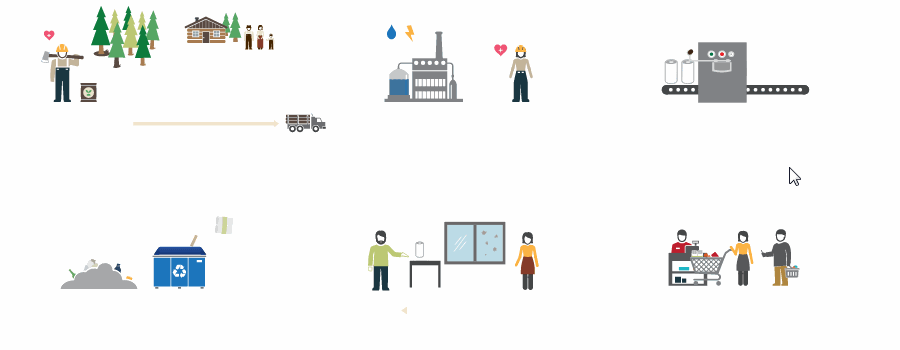
| HOTSPOTS | KPIs |
|---|---|
Community RightsForestry OperationsLocal communities can be negatively affected by forestry operations due to loss of land use, timber rights, and cultural heritage. |
|
Illegal LoggingForestry OperationsHarvesting timber illegally may lead to biodiversity loss and impact land rights of local communities. |
|
Labor RightsWood SourcingForestry operations may use child labor, as well as violate other labor rights. |
|
Land Conversion and DeforestationForestry OperationsIneffective forest management can lead to environmental impacts and climate change from deforestation. |
|
Pesticide ApplicationWood SourcingPesticide use can impact biodiversity, water quality, and human health. |
|
Worker Health and SafetyForestry OperationsWorkers can develop serious health problems from exposure to the chemicals used to make pulp and paper and physical injury from other occupational hazards. |
|
| HOTSPOTS | KPIs |
|---|---|
Chemical UsePulp ProductionChemicals used for pulping and bleaching can pollute the environment. |
|
Energy ConsumptionPulp and Paper ProductionEnergy generated to power manufacturing processes can cause climate change, damage the environment, deplete resources and impact human health. |
|
Water UsePulp ProductionWater use during pulp and paper manufacture can deplete freshwater resources. |
|
| HOTSPOTS | KPIs |
|---|---|
Packaging DisposalResource ImpactsLow recovery of packaging material results in depletion of resources and environmental and social impacts from extracting raw materials. |
|
| HOTSPOTS | KPIs |
|---|---|
Packaging DisposalResource ImpactsLow recovery of packaging material results in depletion of resources and environmental and social impacts from extracting raw materials. |
|
TSC has found that there are no Hotspots identified in this stage that meet our scientific methodology.
*Supported browsers: Google Chrome, Mozilla Firefox (v.42.0), Safari, IE
![]() worker or community health & safety
worker or community health & safety
![]() electricity use
electricity use
![]() water use
water use
Click the buttons above for interactive diagrams of any of the three selected categories.
TSC research shows that, with most products, the most significant environmental and social hotspots exist largely upstream from the manufacturer in their supply chain or downstream from consumer use and product disposal. Responses from over 2,500 surveys and 1,700 suppliers indicate, however, that most manufacturers have limited visibility into their supply chains and their related sustainability risks. Nevertheless, by enabling retailers and procurement teams to send a market signal to such a broad range of manufacturers, TSC has helped transform what were once blind spots into hotspots. The next step is taking action on these hotspots: the data demonstrate how sustainability leadership in different product categories is both possible and already exists, and so the vision of making all products more sustainable is now a realistic one.
Three steps are needed to green global supply chains by moving from hotspots to actions. First, retailers should commit to a common platform to measure and track consumer product sustainability. Retailers and procurement teams are uniquely positioned to influence consumer products and their supply chains. Second, manufacturers should drive supply chain visibility and performance, which will also enhance their own business outcomes and reduce risk. Third, stakeholders should partner to align and drive scale: companies, NGOs, and other organizations can work together to create scale by harmonizing existing metrics and tools, and drive continued momentum by collaborating on shared initiatives to address key hotspots.
Our goal is to create a consumer-goods ecosystem that is sustainable using a common approach to measuring and tracking the product sustainability of $1 trillion of retailer sales over the next five years.
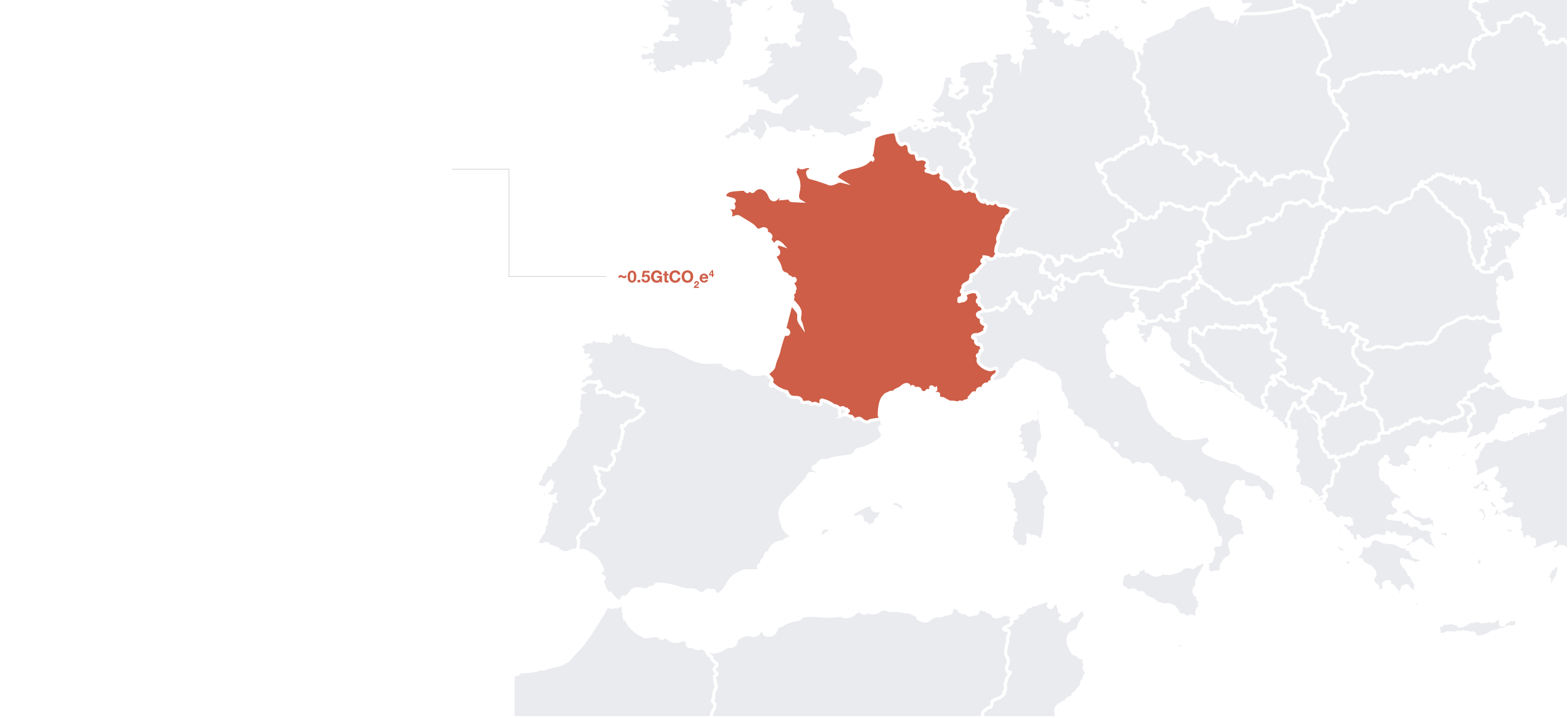
if just $1 trillion of retail trade were on a path to decrease greenhouse gas emissions by 2 percent annually for ten years, it would remove the equivalent of France’s entire annual greenhouse gas emissions from our atmosphere.
We believe this is achievable and meaningful enough to tip the balance in consumer goods supply chains towards transformational change that also spurs innovation and growth.
Thank you for your interest in our first-ever impact report. When you read through this report, you will visualize what a pivotal time it is for the consumer goods industry, sustainability, and for The Sustainability Consortium (TSC).
This is why your support matters now more than ever.
Your support helps TSC continue to drive positive, environmental and social change within the consumer goods industry. By supporting TSC through a donation of any amount:
Donate and download our impact report to understand more about the work being done by The Sustainability Consortium that can make a difference in your business, daily life, and the future of our planet! Your donation shows your support of our mission! Thank you!
We invite you to explore our contributors, members, and founding members. See a company you love? Send them a note of gratitude for their efforts in the improvement of consumer goods.